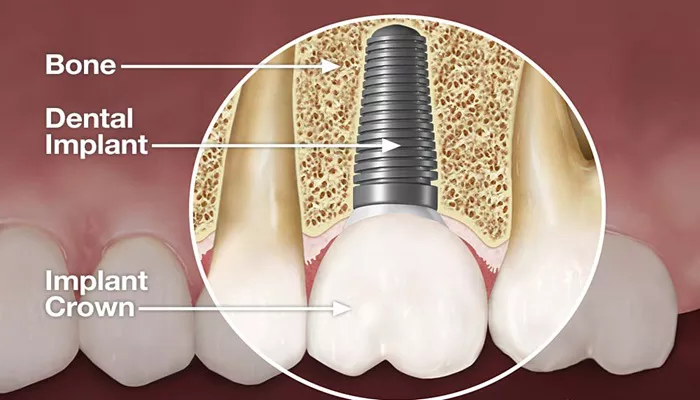Dental implants have revolutionized the field of prosthodontics, offering a reliable and aesthetically pleasing solution for missing teeth. However, they are not always the best option for everyone. Understanding the alternatives to dental implants and the reasons why someone might want to avoid them can help patients make informed decisions about their oral health.
This article aims to provide a detailed and science-based explanation of how to avoid dental implants, addressing the various factors to consider, the potential risks and benefits of implants, and the alternative treatment options available.
Understanding Dental Implants and Their Limitations
Dental implants are artificial tooth roots made of titanium or titanium alloy that are surgically placed into the jawbone to support a replacement tooth or bridge. They offer a stable and long-lasting solution for missing teeth, providing improved chewing function, better aesthetics, and preserving the surrounding bone and tissue. However, dental implants are not suitable for everyone. There are several factors that can make implants a less desirable option, including medical conditions, anatomical limitations, and personal preferences.
Reasons to Avoid Dental Implants
Medical Conditions
Diabetes: Diabetic patients may have slower healing and increased risk of infection, which can compromise the success of dental implants.
Osteoporosis: Patients with osteoporosis have weaker bones, which may not provide enough support for dental implants.
Autoimmune Diseases: Conditions like rheumatoid arthritis can affect the body’s ability to heal and integrate implants properly.
Bleeding Disorders: Patients with bleeding disorders or taking blood-thinning medications may have increased bleeding during surgery, which can complicate the procedure.
Anatomical Limitations
Insufficient Bone Density: If the jawbone is not dense enough to support implants, additional procedures like bone grafting may be required, which can increase the cost and complexity of treatment.
Nerve Damage Risk: In some cases, the placement of implants may be too close to vital nerves, increasing the risk of nerve damage and complications.
Sinus Issues: Patients with low sinus floors may not have enough bone height for implant placement without risking sinus perforation.
Personal Preferences and Lifestyle
Cost: Dental implants can be expensive, and some patients may prefer more affordable options like removable dentures or bridges.
Fear of Surgery: Many patients are anxious about undergoing surgery and prefer non-surgical options.
Maintenance: Dental implants require regular maintenance and cleaning, and some patients may prefer simpler oral hygiene routines.
How to Avoid Dental Implant?
Removable Dentures
Complete Dentures: These are full sets of artificial teeth that can be removed and cleaned daily. They are suitable for patients with multiple missing teeth and offer a cost-effective solution.
Partial Dentures: These are designed to fill in gaps left by missing teeth and are attached to a metal framework that fits around the remaining teeth.
Fixed Bridges
Traditional Bridges: These involve crowns being placed on the adjacent teeth to support a pontic (false tooth) that fills the gap. They are a permanent solution and offer stable support for missing teeth.
Implant-Supported Bridges: These use dental implants to support a bridge, providing improved stability and reducing the need for crowns on adjacent teeth.
Orthodontic Treatment
In some cases, missing teeth can be addressed with orthodontic treatment, such as braces or Invisalign, to close gaps or shift teeth into better positions.
Bone Grafting and Sinus Lifts
For patients with insufficient bone density, bone grafting can be performed to build up the jawbone and make it suitable for implant placement.
Sinus lifts are used to increase the bone height in the upper jaw by lifting the sinus membrane and adding bone graft material.
Potential Risks and Benefits of Dental Implants
While dental implants offer many benefits, including improved chewing function, better aesthetics, and preservation of bone and tissue, they also have potential risks and complications. These include:
Infection: Improper oral hygiene or underlying medical conditions can increase the risk of infection.
Implant Failure: If the implant does not integrate properly with the jawbone, it may fail and require removal.
Damage to Surrounding Teeth and Structures: Improper placement or excessive force can damage adjacent teeth, nerves, or sinuses.
Additional Procedures: In some cases, additional procedures like bone grafting or sinus lifts may be required to make the jawbone suitable for implant placement.
Making an Informed Decision
When considering whether to avoid dental implants, it is essential to weigh the potential benefits and risks against your individual needs and preferences. Consulting with a qualified dental professional can help you understand your options and make an informed decision. Your dentist will assess your medical history, oral health, and personal goals to determine the best treatment plan for you.
Conclusion
In conclusion, dental implants are not always the best option for everyone. By understanding the reasons to avoid implants, the alternative treatment options available, and the potential risks and benefits, patients can make informed decisions about their oral health. Consulting with a qualified dental professional is crucial to ensure that you receive the most appropriate and effective treatment for your needs. Remember, the ultimate goal is to maintain a healthy, functional, and aesthetically pleasing smile.
Related topics:

